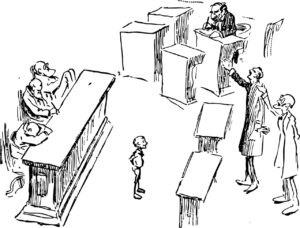Just about any adult who is on the electoral roll in Massachusetts could be picked at random for jury duty in the state, so if this has happened to you and you are unsure what it means, read on below.
Who are jurors?
Jurors are people from all walks of life who have been randomly chosen to serve on a jury for a single day or the whole period of a trial. Jury service is an important duty in Massachusetts as the decisions made by the jurors during a trial can make a difference one way or another whether a person has committed a crime or whether a defendant in a civil trial loses the case against them and faces penalties of one sort or another.
Jurors are chosen off the electoral roll, but there are eligibility criteria attached to their inclusion in a jury. If you have been served with a summons to serve as a juror, the first thing you should do is to decide whether you are eligible for jury duty. If you are not, you can request a cancellation of the summons. There are some reasons why you may also be able to request a cancellation of the summons even if you are eligible.
Eligibility for jury duty in Massachusetts
There are 10 main criteria that determine whether a person is eligible for jury duty. You may be disqualified if you can show that you match one of these criteria. These are the following:
- You must be a U.S. citizen.
- You must be 18 years of age or older.
- You must be resident in Massachusetts for at least 50% of the time.
- You must have enough English ability to understand the proceedings of the trial.
- You should not have had a criminal offence in the last 7 years and are still in custody or remain charged with that offence.
- You have sole responsibility for looking after a permanently disabled person living with you in the same home and that person’s welfare would be seriously compromised if you served on a jury.
- You have some type of disability, mental or physical, that prevents you from serving as a juror.
- You are not living in the jurisdiction of the court where the trial will take place and do not expect to return there within the next 12 months.
- You are over 70 and choose not to serve as a juror.
- You have already served on a jury (state or federal) in the last 3 years or are currently serving.
Who pays for jury service?
One of the first questions that people who have been summoned to serve as a juror is whether they need special permission from their employer or whether they will get paid at all if they serve on a jury.
Jury service is considered an essential service in every state of the United States. In fact, the concept of a jury has been around since antiquity. It was first developed in Ancient Greece, but Massachusetts’ version of jury service originated in English common law. The primacy of jury service means that employers must allow their employees to attend jury service and self employed people must also attend. The only reasons why someone can request a disqualification have already been listed above. Employers cannot retaliate against one of their employees who has been summoned for jury service. This would be considered an illegal act in itself.
Just because jury service is essential, it doesn’t mean that jurors have to pay their own expenses. Employers are expected to pay the first three days of absence on jury service, while after that, the court will pay the juror for the remaining time. If you are self-employed, you are responsible for the first three days, while the court will pay for the remaining days of the trial. Unemployed people will be compensated at the current rate of $50 a day while on jury service.
Responding to a jury summons
It is important to respond to a summons for jury service. If you fail to do so or do not turn up for jury service without responding unless you have been officially disqualified you could face penalties, or at least rescheduling of your summons.
You can respond to a summons by mail, over the phone or online. When you respond you should include important reference information that identifies you. This includes the badge number and PIN which you can find above your name on the initial summons and reminder notice. You also need to include your ZIP code.
You can respond by confirming your readiness to attend jury service, request disqualification because you fit one or more of the criteria listed above, defer the service to another date giving a reason or request a transfer to another courthouse if attending the one specified could cause hardship.
The Confidential Juror Questionnaire
You will receive a confidential juror questionnaire (CJQ) about 10 days before the trial starts. This is a form you need to complete which provides valuable information about you for use by the court to determine whether you are a suitable person to attend the particular trial you have been chosen for. When you complete this form, you sign it and bring it with you when first attending jury service. At the end of the questionnaire is a demographic survey which provides the court with information that helps them determine whether the spread of jurors they are selecting at random represents the diversity of people in the community.
Attending the court
It is well to be prepared to attend the court on the first day. After the first day, if you have to attend the whole trial, everything will be more familiar to you. There are no specific dress codes, apart from not dressing outrageously. You can bring with you a cell phone, food, coffee or something else to drink. You will be given instructions about when to attend and where to park if you come by car. The average attendance is between 1 to 3 days, but a trial could last longer. After giving your CJQ over and going through security, you will sit in a room where you may be waiting to be called at the start of the trial or may be excused for one reason or another. Most court sessions finish by 4.30 pm.
For more information, visit our website Mucci Legal or contact us for a free initial legal consultation today.


